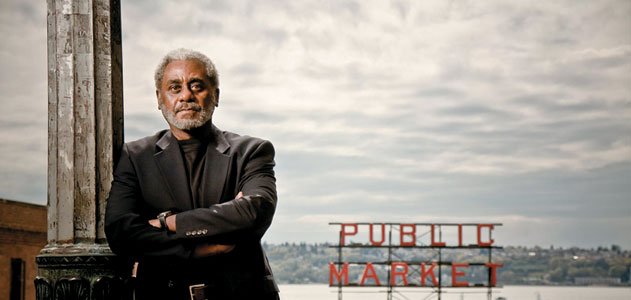Not So Comfortable
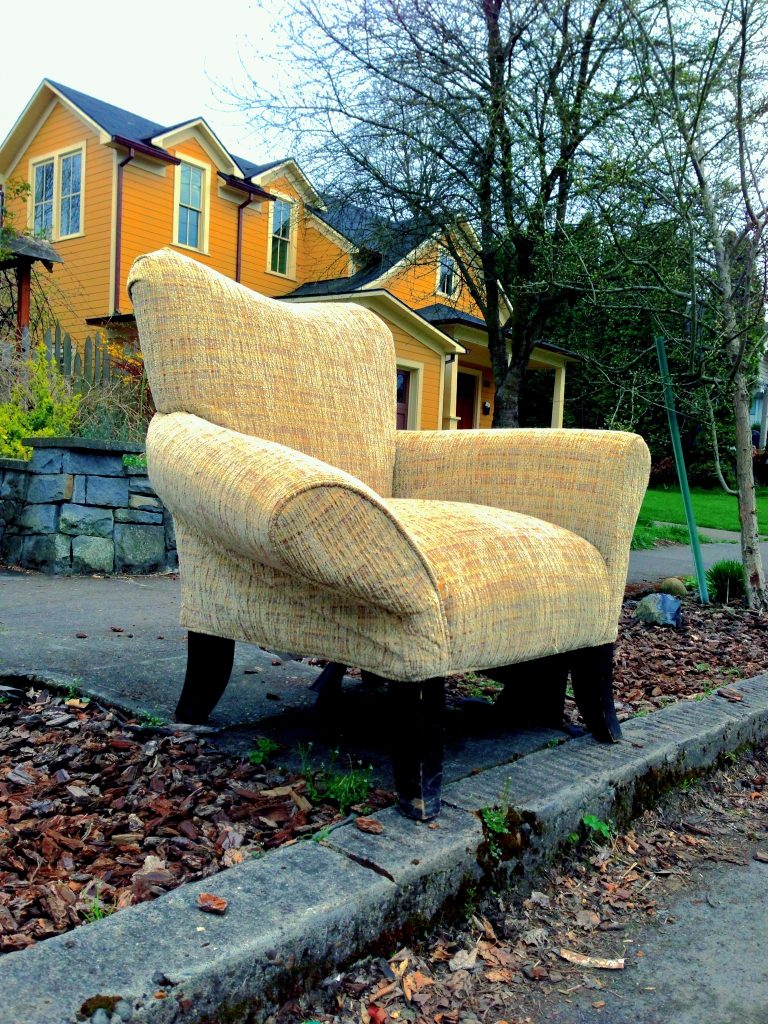 As I mentioned in a previous post, I’ve started to expand a bit beyond my cultural comfort zone by reading more books by African-American authors. I am sad to admit that in the past I thought books by these authors — particularly books about the experience of being black in this country — had nothing to do with me. As if the everyday privileges I enjoy as a result of being white…including the privilege of remaining blissfully unaware of those privileges…were not given to me at the expense of others who are excluded from those privileges. (In case you don’t know what I’m talking about, pull up a chair and read this: The Case for Reparations.)
As I mentioned in a previous post, I’ve started to expand a bit beyond my cultural comfort zone by reading more books by African-American authors. I am sad to admit that in the past I thought books by these authors — particularly books about the experience of being black in this country — had nothing to do with me. As if the everyday privileges I enjoy as a result of being white…including the privilege of remaining blissfully unaware of those privileges…were not given to me at the expense of others who are excluded from those privileges. (In case you don’t know what I’m talking about, pull up a chair and read this: The Case for Reparations.)
So I was delighted to hear yesterday that a black American, Paul Beatty, has won the Man Booker Prize for his novel, The Sellout. It’s definitely outside of my comfort zone, but I’m going for it. Here’s the opening paragraph:
This may be hard to believe, coming from a black man, but I’ve never stolen anything. Never cheated on my taxes or at cards. Never snuck into the movies or failed to give back the extra change to a drugstore cashier indifferent to the ways of mercantilism and minimum-wage expectations. I’ve never burgled a house. Held up a liquor store. Never boarded a crowed bus or subway car, sat in a seat reserved for the elderly, pulled out my gigantic penis and masturbated to satisfaction with a perverted, yet somehow crestfallen, look on my face. But here I am, in the cavernous chambers of the Supreme Court of the United States of America, my car illegally and somewhat ironically parked on Constitution Avenue, my hands cuffed and crossed behind my back, my right to remain silent long since waived and said goodbye to as I sit in a thickly padded chair that, much like this country, isn’t quite as comfortable as it looks.
No Thanks, I’ll Pass
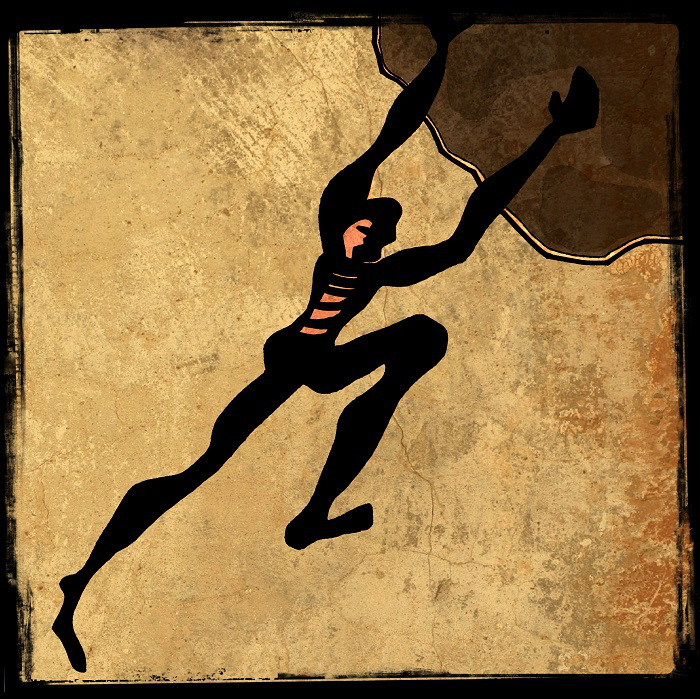 Our KM group met last night to discuss the chapter on Renunciation in Joseph Goldstein’s Mindfulness: A Practical Guide to Awakening. The word “renunciation” has a lot of negative connotations, but in this case we’re not talking about depriving ourselves of joy and comfort and pleasure. We’re finding peace and ease by releasing ourselves from the “addiction” of habitual patterns.
Our KM group met last night to discuss the chapter on Renunciation in Joseph Goldstein’s Mindfulness: A Practical Guide to Awakening. The word “renunciation” has a lot of negative connotations, but in this case we’re not talking about depriving ourselves of joy and comfort and pleasure. We’re finding peace and ease by releasing ourselves from the “addiction” of habitual patterns.
Joseph talks about “the wisdom of no, when we recognize that some things are not skillful, not helpful, not leading to happiness. At those times,” he writes,”we can practice saying, ‘No thanks, I’ll pass.'”
But we are often so used to our habits — even our painful, stress-causing habits — that we forget they can be changed.
I like Stephen Mitchell’s take in Parables and Portraits:
“We tend to think of Sisyphus as a tragic hero, condemned by the gods to shoulder his rock sweatily up the mountain, again and again, forever.
“The truth is that Sisyphus is in love with the rock. He cherishes every roughness and every ounce of it. He talks to it. Sings to it. It has become the mysterious Other. He even dreams of it as he sleepwalks upward. Life is unimaginable without it, looming always above him like a huge gray moon.
“He doesn’t realize that at any moment he is permitted to step aside, let the rock hurdle to the bottom, and go home.
“Tragedy is the inertial force of the mind.”
Joseph’s “True Confession”
I was listening to one of Joseph’s talks — Creating a Concept of Self — when I was surprised (and delighted) to hear him “confess” to a fondness for mystery novels (a fondness that I share)….and then to hear him close his talk with this passage from a distinctly unusual source of dharma wisdom — the detective novel, Bangkok Tattoo, by John Burnet:
“You see, dear readers, speaking frankly and without any intention to offend, you are a ramshackle collection of coincidences held together by a desperate and irrational clinging.
“There is no center at all. Everything depends on everything else. Your body depends on the environment. Your thoughts depend on whatever junk floats in from the media. Your emotions are largely from the reptilian end of your DNA. Your intellect is a chemical computer that can’t add up a zillionth as fast as a pocket calculator. And even your best side is a superficial piece of social programming that will fall apart just as soon as your spouse leaves with the kids and the money in your joint account, or the economy starts to fail and you get the sack, or you get conscripted into some idiot’s war.
“To name the amorphous morass of self-pity, vanity and despair: “self”, is not only the height of hubris, it is also proof — if any were needed — that we are above all a delusional species. We are in a trance from birth to death. Prick the balloon and what do you get? Emptiness.
“Take two steps in the divine art of Buddhist meditation and you will find yourself on a planet you no longer recognize. Those needs and fears you thought were the very bones of your being turn out to be no more than bugs in your software.”
This Too Needs to Be Heard
As part of the Community Dharma Leader (CDL) program and the awareness to my own cultural blindness it has opened in me, I’ve started reading more books, articles, newspaper stories, etc. about racism and the experience of being black in this country — Between the World and Me, by Ta-Nehisi Coates and Underground Railroad by Colson Whitehead, for example.
Frankly, it’s been difficult. And painful. And upsetting. But also rewarding.
Then just when I thought I was really being open to the “other,” even congratulating myself on my willingness to listen, to hear the suffering, to see my own contribution to that suffering — I hit the wall at an even more challenging level of habitual “other-ing” in Arlie Hoschschild’s highly acclaimed: Strangers in Their Own Land: Anger and Mourning on the American Right, subtitled “A Journey to the Heart of Our Political Divide.”
This is one book I really, REALLY did not want to read.
But I know that this too needs to be heard.
So I’ve started in. (Thankfully, the writing is beautiful.)
Here’s a quote from the prelude:
“We, on both sides, wrongly image that empathy with the ‘other’ side brings an end to clearheaded analysis when, in truth, it’s on the other side of that bridge that the most important analysis can begin.
“The English language doesn’t give us many words to describe the feeling of reaching out to someone from another world, and of having that interest welcomed. Something of its own kind, mutual, is created. What a gift.
“Gratitude, awe, appreciation; for me, all those words apply and I don’t know which to use. But I think we need a special word, and should hold a place of honor for it, so as to restore what might be a missing key on the English-speaking world’s cultural piano. Our polarization, and the increasing reality that we simply don’t know each other, makes it too easy to settle for dislike and contempt.”
What it Means to Be Free. Truly Free.
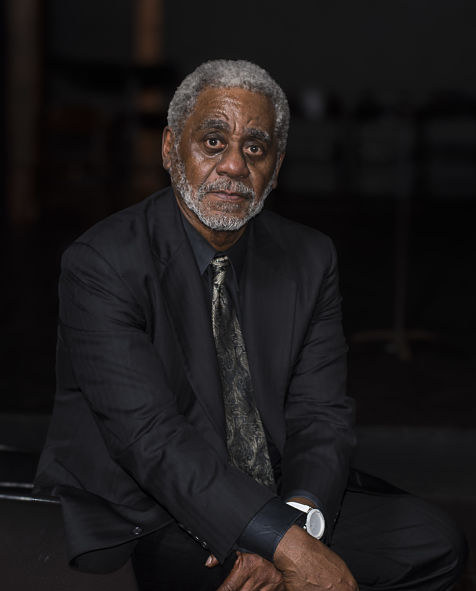 For me as a writer and artist (which I had almost forgotten I was until I heard this man speak about his life — and Buddhism — as an expression of these things), the highlight of the CDL training retreat last week was a visit from Dr. Charles Johnson, the amazing writer, artist, speaker, prize winner, teacher, philosopher….listener!….who I am ashamed to say I had never even heard of before the CDL program.
For me as a writer and artist (which I had almost forgotten I was until I heard this man speak about his life — and Buddhism — as an expression of these things), the highlight of the CDL training retreat last week was a visit from Dr. Charles Johnson, the amazing writer, artist, speaker, prize winner, teacher, philosopher….listener!….who I am ashamed to say I had never even heard of before the CDL program.
To give you just a glimpse of the breath and depth of this man, let me quote from the preface of one of his twenty-two books, Turning the Wheel: Essays on Buddhism and Writing.
“From my parents and grandparents, who were born during America’s century of apartheid, from unrecorded stories I heard told by family and friends, then later from a lifetime of studying black culture, literature, and history, I came to see that if black America has a defining essence (eidos) or meaning that runs threadlike from the colonial era through the post-Civil Rights period, it must be the quest for freedom.
“This particular, eidetic sense of our collective meaning, arising out of historical conditions, and the way the Founding Fathers’ ideal of freedom was inscribed with a special meaning in the souls of black folk, has shaped almost every story, essay, novel, drawing, teleplay, and critical article I’ve composed for the last three and a half decades. No matter whether I was writing about Frederick Douglass or James Weldon Johnson, Booker T. Washington or Harriet Beecher Stowe, Ralph Ellison or Phillis Wheatley, my sense of black life in a predominantly white, very Eurocentric society–a slave state until 1863–was that our unique destiny as a people, our duty to our predecessors who sacrificed so much and for so long, and our dreams of a life of dignity and happiness for our children were tied inextricably to a profound and lifelong meditation on what it means to be free. Truly free.
“….The number of black Dharma practitioners will, I predict, grow significantly in the twenty-first century, particularly among our scholars who want a spiritual practice not based on faith or theism and compatible with the findings of modern science; and also among the groundbreaking, innovative artists and writers whose spirit and sense of adventure cannot be contained by the traditions of the West (which, of course, they appreciate), and who hunger–as I did–to experience the world through and be enriched by as many cultural perspectives as possible. All our human inheritance; and all, like Buddhism, have something valuable we can learn.”
On To The Next
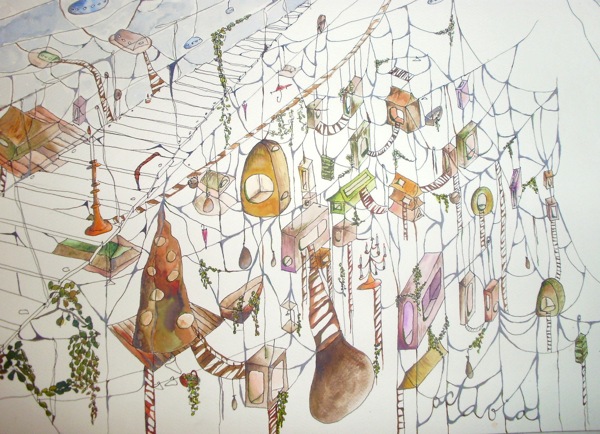 I’m feeling much better, so now I’m preparing to leave on Saturday for the next CDL training retreat. I return on the following Saturday, so check back for my next post on Monday, Oct 3.
I’m feeling much better, so now I’m preparing to leave on Saturday for the next CDL training retreat. I return on the following Saturday, so check back for my next post on Monday, Oct 3.
In the mean time, I leave you with yet another selection from my favorite guide for travelers: Invisible Cities, by Italo Calvino.
Trading Cities. 4.
In Ersilia, to establish the relationships that sustain the city’s life, the inhabitants stretch strings from the corners of the houses, white or black or gray or black-and-white according to whether they mark a relationship of blood, of trade, authority, agency. When the strings become so numerous that you can no longer pass among them, the inhabitants leave: the houses are dismantled; only the strings and their supports remain.
From a mountainside, camping with their household goods, Ersilia’s refugees look at the labyrinth of taunt strings and poles that rise in the plain. That is the city of Ersilia still, and they are nothing.
They rebuild Ersilia elsewhere. They weave a similar pattern of strings which they would like to be more complex and at the same time more regular than the other. Then they abandon it and take themselves and their houses still farther away.
Thus, when traveling in the territory of Ersilia, you come upon the ruins of the abandoned cities, without the walls which do not last, without the bones of the dead which the wind rolls away: spiderwebs of intricate relationships seeking a form.
The Citizens are Mistaken
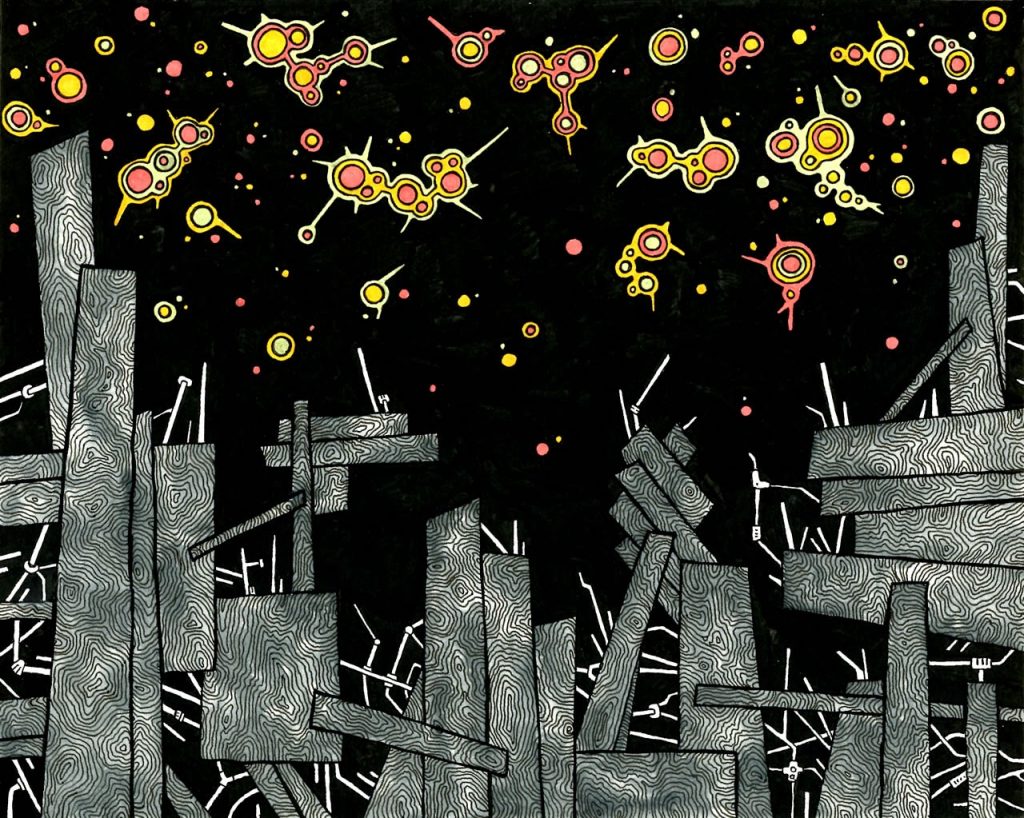 Note: I leave on Sunday (8/21) for a retreat at Spirit Rock and won’t get home until very late on Aug 30. It will take me awhile to get back to “normal” once I return, so I probably won’t be posting again until Monday, Sept 5. Please check back then.
Note: I leave on Sunday (8/21) for a retreat at Spirit Rock and won’t get home until very late on Aug 30. It will take me awhile to get back to “normal” once I return, so I probably won’t be posting again until Monday, Sept 5. Please check back then.
As part of my getting-ready-to-travel ritual, I have selected a passage (more or less at random) from Invisible Cities, by Italo Calvino, to accompany me as I venture out into the world.
I offer it here for your digital traveling pleasure:
Cities & The Sky. 2.
This belief is handed down in Beersheba: that, suspended in the heavens, there exists another Beersheba, where the city’s most elevated virtues and sentiments are poised, and that if the terrestrial Beersheba will take the celestial one as its model the two cities will become one. The image propagated by tradition is that of a city of pure gold, with silver locks and diamond gates, a jewel-city, all inset and inlaid, as a maximum of laborious study might produce when applied to materials of maximum worth. True to this belief, Beersheba’s inhabitants honor everything that suggest for them the celestial city: they accumulate noble metals and rare stones, they renounce all ephemeral excesses, they develop forms of composite composure.
They also believe, these inhabitants, that another Beersheba exists underground, the receptacle of everything base and unworthy that happens to them, and it is their constant care to erase from the visible Beersheba every tie or resemblance to the lower town. In the place of roofs they imagine that the underground city has overturned rubbish bins, with cheese rinds, greasy paper, fish scales, dishwater, uneaten spaghetti, old bandages spilling from them. Or even that its substance is dark and malleable and thick, like the pitch that pours down from the sewers, prolonging the route of the human bowels, from black hole to black hole, until it splatters against the lowest subterranean floor, and from the lazy, encircled bubbles below, layer upon layer, a fecal city rises, with twisted spires.
In Beersheba’s beliefs there is an element of truth and one of error. It is true that the city is accompanied by two projections of itself, one celestial and one infernal; but the citizens are mistaken about their consistency. The inferno that broods in the deepest subsoil of Beersheba is a city designed by the most authoritative architects, built with the most expensive materials on the market, with every device and mechanism and gear system functioning, decked with tassels and fringes and frills hanging from all the pipes and levers.
Intent on piling up its carats of perfection, Beersheba takes for virtue what is now a grim mania to fill the empty vessel of itself; the city does not know that its only moments of generous abandon are those when it becomes detached from itself, when it lets go, expands. Still, at the zenith of Beersheba there gravitates a celestial body that shines with all the city’s riches, enclosed in the treasury of cast-off things: a planet a-flutter with potato peels, broken umbrellas, old socks, candy wrappings, paved with tram tickets, fingernail-cuttings and pared calluses, eggshells. This is the celestial city, and in its heavens long-tailed comets fly past, released to rotate in space from the only free and happy action of the citizens of Beersheba, a city which, only when it shits, is not miserly, calculating, greedy.
What It Means To Be Civilized
As part of this month’s CDL homework, I’ve been reading selections from “Taming the Ox: Buddhist Stories and Reflections of Politics, Race, Culture and Spiritual Practice“, by Charles Johnson (pictured above, who will be a guest speaker at our next training retreat in September).
Here’s a passage that strikes me as particularly important–and timely–even though (maybe especially because) it was written more than 10 years ago:
“….At stake in the Martin Luther King, Jr. story are not only questions about American race relations but also deeper issues, older conundrums about what it means to be civilized in the political and social world, about how one confronts social evil without creating evil, division, and enmity, even questions about what Buddhists call pattica samuppada (Dependent Origination) that resonate beneath the surface of King’s remarkable and too-brief thirty-nine years of life.
“Clearly these are matters of urgency–especially the demand for civility–when in our spiritually bankrupt world awash in pop-culture vulgarity and terrorist acts…our leaders during the last presidential campaign [2004], on both the left and the right, shamelessly employed in their desire to ‘win’ such tactics as mudslinging and character assassination. (Prescient, King once stated, ‘We shall have to create leaders who embody virtues we can respect,’ and also counseled, ‘We must be sure that our hands are clean in the struggle.’)
“Would that today’s arrogant, ankle-biting and so often shortsighted politicians, with their red-meat rhetoric, might remember what King told Freedom Riders in 1960: ‘Our ultimate end must be the creation of the beloved community.'”
According to How We Act
 I’m still getting ready for the “Let’s Talk Dharma” discussion on Karma (which meets tonight at my house!), so I’ll just post a quick quote from Ajahn Sucitto’s really wonderful book on the topic: Kamma and the End of Kamma. (click here for free e-book)
I’m still getting ready for the “Let’s Talk Dharma” discussion on Karma (which meets tonight at my house!), so I’ll just post a quick quote from Ajahn Sucitto’s really wonderful book on the topic: Kamma and the End of Kamma. (click here for free e-book)
“The past is not dead; its effects carry potential. The future will arise according to how we act on that.”
Traveling in Italian
 I leave tomorrow for a few weeks in Italy. I’ll be staying awhile in Florence (this photo is of the room I’ll be staying in!) and then I’ll go on to a little town about an hour away, Castiglion Fiorentino, where I’ll visit with friends, take a writing workshop, and practice speaking Italian!
I leave tomorrow for a few weeks in Italy. I’ll be staying awhile in Florence (this photo is of the room I’ll be staying in!) and then I’ll go on to a little town about an hour away, Castiglion Fiorentino, where I’ll visit with friends, take a writing workshop, and practice speaking Italian!
I won’t post again until I return, so check back sometime after June 14.
As always, before I embark on any significant journey, I consult my favorite “travel guide,” Invisible Cities, by Italo Calvino:
Cities & Names 3
For a long time Pyrrha to me was a fortified city on the slopes of a bay, with high windows and towers, enclosed like a goblet, with a central square deep as a well, with a well in its center. I had never seen it. It was one of the many cities where I had never arrived, that I conjured up, through its name: Euphrasia, Odile, Margara, Getullia. Pyrrha had its place among them, different from each of them, and like each of them, unmistakable to the mind’s eye.
The day came when my travels took me to Pyrrha. As soon as I set foot there, everything I had imagined was forgotten; Pyrrha had become what is Pyrrha; and I thought I had always known that the sea is invisible from the city, hidden behind a dune of the low, rolling coast; that the streets are long and straight; that the houses are clumped at intervals, not high, and they are separated by open lots with stacks of lumber and with sawmills; that the wind stirs the vanes of the water pumps. From that moment on the name Pyrrha has brought to my mind this view, this light, this buzzing, this air in which a yellowish dust flies: obviously the name means this and could mean nothing but this.
My mind goes on containing a great number of cities I have never seen and will never see, names that bear with them a figure or a fragment or glimmer of an imagined figure: Getullia, Odile, Euphrasia, Margara. The city high above the bay is also there still, with the square enclosing the well, but I can no longer call it by a name, nor remember how I could ever have given it a name that means something entirely different.
***
Arrivederci. Ci vediamo presto!



